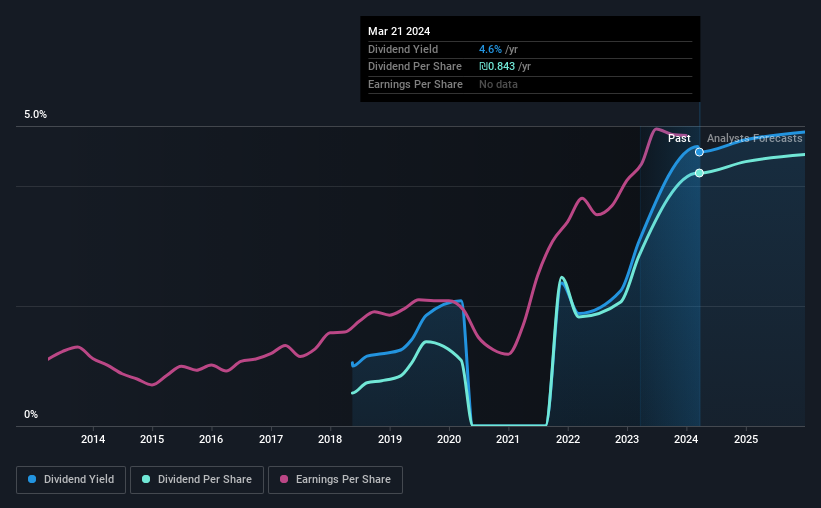Stock Analysis

Israel Discount Bank Limited (TLV:DSCT) is about to trade ex-dividend in the next 3 days. Typically, the ex-dividend date is one business day before the record date which is the date on which a company determines the shareholders eligible to receive a dividend. The ex-dividend date is important because any transaction on a stock needs to have been settled before the record date in order to be eligible for a dividend. In other words, investors can purchase Israel Discount Bank's shares before the 26th of March in order to be eligible for the dividend, which will be paid on the 4th of April.
The company's next dividend payment will be ₪0.1485839 per share, and in the last 12 months, the company paid a total of ₪0.84 per share. Calculating the last year's worth of payments shows that Israel Discount Bank has a trailing yield of 4.6% on the current share price of ₪18.47. If you buy this business for its dividend, you should have an idea of whether Israel Discount Bank's dividend is reliable and sustainable. We need to see whether the dividend is covered by earnings and if it's growing.
See our latest analysis for Israel Discount Bank
Dividends are typically paid out of company income, so if a company pays out more than it earned, its dividend is usually at a higher risk of being cut. Israel Discount Bank has a low and conservative payout ratio of just 25% of its income after tax.
Generally speaking, the lower a company's payout ratios, the more resilient its dividend usually is.
Click here to see the company's payout ratio, plus analyst estimates of its future dividends.

Have Earnings And Dividends Been Growing?
Companies with consistently growing earnings per share generally make the best dividend stocks, as they usually find it easier to grow dividends per share. If business enters a downturn and the dividend is cut, the company could see its value fall precipitously. It's encouraging to see Israel Discount Bank has grown its earnings rapidly, up 21% a year for the past five years.
Another key way to measure a company's dividend prospects is by measuring its historical rate of dividend growth. In the past six years, Israel Discount Bank has increased its dividend at approximately 40% a year on average. It's exciting to see that both earnings and dividends per share have grown rapidly over the past few years.
Final Takeaway
From a dividend perspective, should investors buy or avoid Israel Discount Bank? Typically, companies that are growing rapidly and paying out a low fraction of earnings are keeping the profits for reinvestment in the business. Perhaps even more importantly - this can sometimes signal management is focused on the long term future of the business. We think this is a pretty attractive combination, and would be interested in investigating Israel Discount Bank more closely.
So while Israel Discount Bank looks good from a dividend perspective, it's always worthwhile being up to date with the risks involved in this stock. Every company has risks, and we've spotted 2 warning signs for Israel Discount Bank (of which 1 makes us a bit uncomfortable!) you should know about.
A common investing mistake is buying the first interesting stock you see. Here you can find a full list of high-yield dividend stocks.
Valuation is complex, but we're helping make it simple.
Find out whether Israel Discount Bank is potentially over or undervalued by checking out our comprehensive analysis, which includes fair value estimates, risks and warnings, dividends, insider transactions and financial health.
View the Free AnalysisHave feedback on this article? Concerned about the content? Get in touch with us directly. Alternatively, email editorial-team (at) simplywallst.com.
This article by Simply Wall St is general in nature. We provide commentary based on historical data and analyst forecasts only using an unbiased methodology and our articles are not intended to be financial advice. It does not constitute a recommendation to buy or sell any stock, and does not take account of your objectives, or your financial situation. We aim to bring you long-term focused analysis driven by fundamental data. Note that our analysis may not factor in the latest price-sensitive company announcements or qualitative material. Simply Wall St has no position in any stocks mentioned.
About TASE:DSCT
Israel Discount Bank
Israel Discount Bank Limited, together with its subsidiaries, provides various banking and financial services in Israel, Europe, and North America.
Very undervalued with flawless balance sheet.

